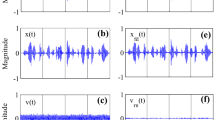Abstract
In this study, for analysis speech signal the 10th order LPC synthesis filter is split into five 2nd order filters to avoid the nonlinear interactions of the poles. This novel algorithm allows us to reconstruct the wideband speech signal from the narrowband one by using the relationship between AR coefficients and its corresponding analog poles. The relationships between AR parameters and the continuous poles are presented.
Access this chapter
Tax calculation will be finalised at checkout
Purchases are for personal use only
Similar content being viewed by others
References
Mizuno H, Abe M, Hirokawa T (1993) Waveform-based speech synthesis approach with a formant frequency modification. In: Proceedings of ICASSP’93, pp II,195–198
Kondoz AM (1994) Digital speech (coding for low bit rate communications systems). Wiley, Chichester
Papoulis A, Pillai SU (2002) Probability, random variables, and stochastic Processes, 4th edn. McGraw-Hill, Inc., Punta Gorda
Haykin S (1991) Adaptive filter theory, 2nd edn. Prentice-Hall Inc., Upper Saddle River
Schroeder MR (1981) Direct (nonrecursive) relations between cepstrum and predictor coefficients. IEEE Trans ASSP ASSP-29(2):291
Soong FK, Juang B (1993) Optimal quantization of LSP parameters. Trans Speech Audio Process IEEE 1(1):15–24
de Marca JRB (1994) An LSF quantizer for the North-America half-rate speech coder. Trans Veh Technol IEEE 43(3):413–419
Mian GA, Riccardi G (1994) A localization property of line spectral frequencies. Trans Speech Audio Process IEEE 2(4):536–538
Leon-Garcia A (2009) Probability, statistics, and random processes for electrical engineering, 3rd edn. Prentice Hall, Upper Saddle River
Martin KD (1999) Sound-source recognition: a theory and computational model. Ph.D, Dissertation, MIT
Roy G, Kabal P (1991) Wideband CELP speech coding at 16 Kbits/Sec. In: Proceedings of ICASSP’91, pp 17–20
Acknowledgments
This research was supported by Basic Science Research Program through the National Research Foundation of Korea (NRF) funded by the Ministry of Education, Science and Technology (Grant No. 2012-0003583).
Author information
Authors and Affiliations
Corresponding author
Editor information
Editors and Affiliations
Rights and permissions
Copyright information
© 2013 Springer Science+Business Media Dordrecht
About this paper
Cite this paper
You, KB., Lee, KH. (2013). A Study on Splitting LPC Synthesis Filter. In: Park, J.J., Barolli, L., Xhafa, F., Jeong, H.Y. (eds) Information Technology Convergence. Lecture Notes in Electrical Engineering, vol 253. Springer, Dordrecht. https://doi.org/10.1007/978-94-007-6996-0_106
Download citation
DOI: https://doi.org/10.1007/978-94-007-6996-0_106
Publisher Name: Springer, Dordrecht
Print ISBN: 978-94-007-6995-3
Online ISBN: 978-94-007-6996-0
eBook Packages: EngineeringEngineering (R0)




